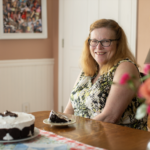By Jasmine Jones
This story was first published in the July 2022 issue of “The Best Years.”
Recipes tell the stories of communities and the people who shape them. Each recipe is more than a list of ingredients and steps: It is a written legacy of the individual who created the dish, their family and history. This monthly series highlights these legacies and gives readers the chance to create the recipes themselves.
Rania Roumany grew up in Lebanon, but frequently visited Syria, the country where both her mother and husband were raised. After she moved to the United States with her husband, they lived in Pennsylvania and St. Louis before settling in Cape Girardeau approximately 17 years ago. Roumany’s four children were born in the United States and grew up in Southeast Missouri. They have been active members of the Islamic Center of Cape Girardeau since they moved here.
“When you live in a community [and] contribute to a community, you feel you are part of it. Some people ask me, ‘Where are you from?’ I feel that I am from everywhere,” Roumany says. “‘Cause I’m from Lebanon, and my husband’s from Syria and my kids were born and raised here. So, it’s like you don’t love or like one child. You love all three of them.”
The Islamic Center of Cape Girardeau was relatively new when the Roumanys joined. It started in the early 1990s when a few Muslim families and students reserved a room at the University Center to pray on Fridays. The group eventually pooled their money to rent an apartment near Southeast Missouri State University. The apartment offered a unified space for the group to pray and gather together, but as the Muslim population in Cape Girardeau grew, so did their need for a larger space. The group purchased the current building at 298 North West End Blvd. in the early 2000s.
In April 2020, on the first day of Ramadan, the Islamic Center of Cape Girardeau was badly damaged in a fire, which was later classified as a hate crime. Roumany says she felt overwhelmed by the immense support and generosity from the Cape Girardeau community after the devastating fire.
“On the same day [of the fire], my phone kept on ringing every minute [with] support from the community centers here in Cape. … Everyone in Cape actually called us and came, and even offered their center for us to pray in,” Roumany says.
The GoFundMe fundraising page for re-building the Islamic Center is still active, and Roumany says an architect has completed plans for their new building, which will be located in the same place as the current building. Roumany says they wanted to keep this location because of its proximity to the university, as a lot of students attend the Islamic Center and some international students rely on the group for help with renting apartments, finding rides to the airport and navigating language barriers.
Roumany is an active member at the Islamic Center and in the Cape Girardeau community. Around 2017, Roumany was part of the Cape Girardeau Interfaith Alliance. Roumany says the alliance started in former Southeast Missouri State University professor Debbie Lee-DiStefano’s kitchen. She says approximately a dozen women were drinking coffee and chatting, when they decided they needed to do something “to the community, from the community.”
The Interfaith Alliance hosted free biannual dinners and invited those in local churches or those not affiliated with a church to join. Roumany says the main purpose of the group was to “spread love, friendship and learn from one another” while having open conversations about each others’ religions.
“When I know you, I know that you are a human being. … We don’t have barriers. People put barriers, because they don’t know. Whenever you have knowledge, you’re good,” Roumany says.
Roumany says the Interfaith Alliance became inactive after the pandemic, but she still participates in activities meant to unite the community and share her culture, such as setting up a table at the university for World Hijab Day or inviting university officials to a Ramadan dinner.
During Ramadan, a holy month in the Islamic faith, Muslims fast until sundown. Roumany says she typically breaks her fasting each day by eating a date or pakora. This helps acclimate her empty stomach to food before the big dinner. Roumany chose to make pakora for this story because of this significance and its ties to other cultures represented at the Islamic Center. Roumany says there are more than 10 countries represented at the Islamic Center, and she joked it was “like the United Nations.” Her friend from Pakistan and Islamic Center member, Maria Sheikh, created the pakora recipe.
Roumany made Arabic coffee along with the pakora, because she says it is a symbol of generosity in her culture. Roumany says one “cannot walk to any house in Lebanon or Syria and not have coffee.” It is a way to welcome guests into one’s home, gather and enjoy conversation.
Arabic coffee is not filtered, so the grounds will remain in the cup after someone drinks it. Roumany says in her culture, people tell fun stories related to what they see in someone’s coffee cup remains. Just as someone looks in the clouds and sees shapes, someone can look in the cup and see stories based on their imagination. Roumany says the tradition is “just a fun way to keep the conversation going” between friends and family.
Roumany says once someone is used to a recipe, or, in her example, coffee — it becomes a part of who they are. It becomes a way to connect with other people both inside and outside one’s culture.
“We just want to be open to each other, as simple as that. At the end, this earth belongs to everyone who wants to live peacefully in harmony with others,” Roumany says. “We believe religion is a way of life. I live in my zone. You live in your zone, and we can interact based on love, friendship and respect.”
Recipe by Maria Sheikh, from the Islamic Center of Cape Girardeau:
Pakora
Vegetable or canola oil for frying
1 cup gram flour or chickpea flour
½ cup water
¾ teaspoon salt or to taste
½ teaspoon coriander powder
½ teaspoon cumin powder
¼ teaspoon garam masala (optional)
¼ teaspoon baking soda
½ large onion (or other vegetables)
½ cup loosely-packed chopped cilantro
½ of a chopped jalapeño or Serrano pepper (optional)
Add water slowly in a bowl of gram flour while whisking to break up lumps. The batter should have the consistency of pancake batter. Add 2 to 4 extra tablespoons of water if needed to achieve that consistency. Whisk in all spices and baking soda. Fold in sliced onions and cilantro. Heat oil in a wok pan over medium-high heat. Drop a pinch of batter to see if the oil is ready; if the batter bubbles and rises, the oil is ready. Grab small chunks of the batter to drop into the oil. Let them fry until orange-brown. Turn over each lump while frying to evenly brown on both sides. Serve on a paper towel to absorb excess oil. Serve with ketchup, chutney or preferred sauce.
This recipe makes 10 to 12 pakoras. You can use onion, cauliflower, spinach, potatoes or any combination of vegetables.

